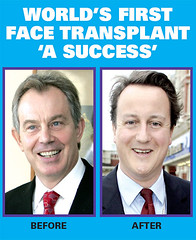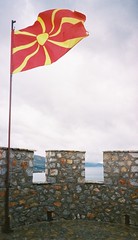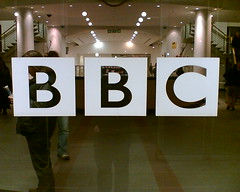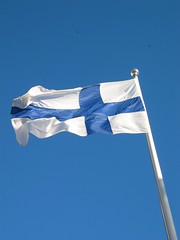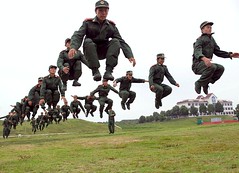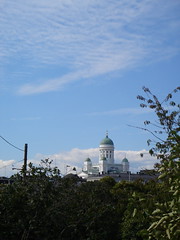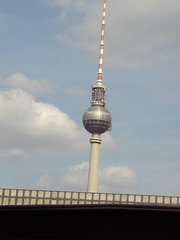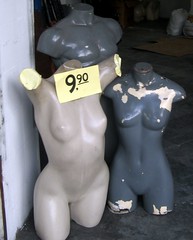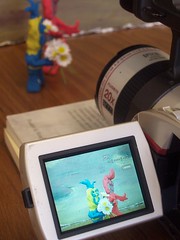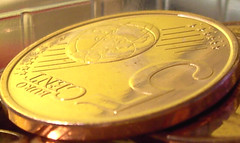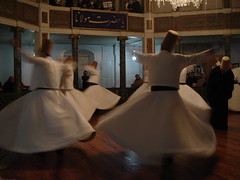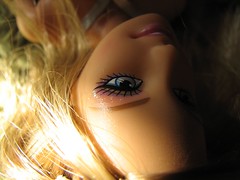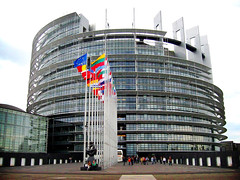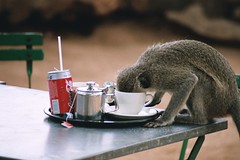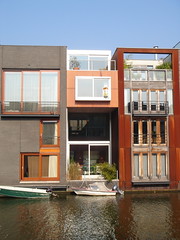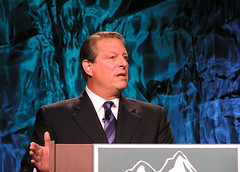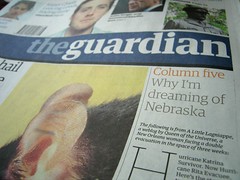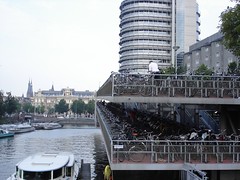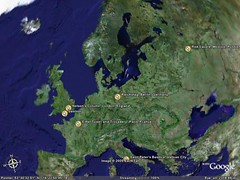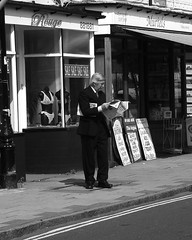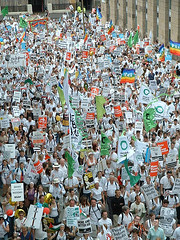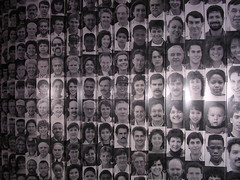Wednesday, December 21, 2005
Whole lot a blurring going on
Well, now there´s a genuine hype around the man on the right. David Cameron is the new leader of the Conservative Party and at least based on his first interview with the Guardian/Observer he seems to go for the same strategy as the guy on the left: reaching out for all, especially the socially conscious and increasingly wealthy middle class.
Few quotes from the interview:
"We think immigration is good for Britain; we think that there are clear benefits in a modern economy from having both emigration and immigration, but that net immigration has to have a very careful regard to good community relations and the fair provision of public services."
"I´m passionately committed to giving people who are being tortured and persecuted asylum, and that means not just letting them in."
"Political clubs ought to be open to everyone. Politics is an equal opportunity thing."
But then my favourite part of the interview: Cameron, who says he is a liberal Conservative (what an earth is that, I would say contradiction in terms) says he is a practical person and not a deeply ideological one. I find these kind of comments really worrying because they really make people dislike politics and politicians with values and belief. Politics should not be about management but about working towards certain goals with clear values.
The most worrying thing is that when you read more closely what Cameron is saying, he is driving a small government policy. The following statements are far from practical solutions but strong value statements:
"Rolling back the state must never leave the poor, the vulnerable and weak behind, and that´s where the state clearly has a role."
He says that the state should give over much more of its work because voluntary bodies are "doing the most innovative and incredible work".
"There is such a thing as society. It´s not the same thing as the state."
Hmm...I think it is quite classical conservative rhetorics to brand public sector as ineffective and promote voluntary work where it would save costs.
Tuesday, December 20, 2005
Who to vote for?
Well, of course the election in question is the one of the Finnish president. We Finns are going to vote in January. The current president (in pic) is likely to win already on the first round. I just received my letter indicating where I should vote.
I also spent two hours watching a stream of a presidential debate a few weeks back. Both in the machines as well as in the debate I was highly interested in how they see the role of Finland in the global and European context and how they formulate their views on immigration. I think these are the few issues where the president really could have an influence.
Well, I found myself being disappointed again. Most of the candidates bring out the issue of unemployment of "real" Finns when immigration is considered ("Before taking more immigrants we need to tackle the problem of unemployment"). I was highly irritated. It is not like our unemployment problems will be solved by closing all borders. In that sense it was excellent that the current president questioned - although very quickly - the goal of full employment.
I was quite disappointed by most of the candidates saying that we need to be more selfish in our immigration policy. More selfish with a 2 % immigrant population? Surprisingly I think it was only the Conservative candidate who mentioned the enriching impact of foreigners to our culture. The ethical question of brain drain was not even mentioned.
Pfff....a recent book published by a Finnish think tank MSL said it quite accurately: Finns tend to forget that we have always relied on other people´s help and that Finns still tend to think like being Finnish would be an ethnic concept. Even taking into consideration the recent integration problems in the Netherlands I do think that Finland and Finns would have a lot to learn from the Dutch way of thinking.
Saturday, December 17, 2005
It's not all about the money
I was embarrassed. I had absolutely no idea what was happening. He elaborated by telling that the European Council would decide on the candidate status of the Former Yugoslav Republic of Macedonia. He said that a negative result would really slide the country into a dangerous direction. "There would be loads of people saying 'we told you so, they would never accept us'", he explained.
Without this discussion I would have totally missed the issue. I followed the summit closely both on Finnish and British media. It was all about the budget. I am not saying that the budget would not be a gigantic issue but I was not able to find a sentence on the decision on Macedonia from the BBC news page.
Well, the EU website helped in this respect. I downloaded the Council conclusions and the paragpraph X.24 reads as follows:
"In the light of the Commission's analysis, the European Council decides to grant candidate country status to the former Yugoslav Republic of Macedonia, taking into account, in particular, the substantial progress made in completing the legislative framework related to the Ohrid Framework Agreement, as well as its track record in implementing the Stabilisation and Association Agreement (including its trade-related provisions) since 2001."
I met my friend today. He was happy, I would even say jolly. He said that this means that the change and progress needs to continue whoever forms the government. He was saying that this means stability for the nation.
Thursday, December 15, 2005
Day with the BBC
I hate being ill. Especially when you are totally powerless and you are not able to think. I tried finishing some documents for work but wasn't able to. Well, I had to admit to myself after 15 minutes that being ill should mean resting, not working with half speed.
I spent the day with the BBC on. The wonderful thing in the Netherlands is that we also get BBC One and Two. I don't know how many news shows I have seen. But I do know by heart Tony Blair's statement on solidarity regarding the EU budget because they showed it three times (oh sorry, they are showing for the fourth time as I write this). I have seen the interview with a French farmer twice. Now the Iraqi prime minister is speaking on Newsnight. Peter Mandelson has blamed the US twice of egoism in the WTO talks. And I have witnessed twice an in-depth analysis on speed cameras on UK roads. A day with the BBC proves a common remark of today's television: recycling is the word of the day.
p.s. I saw for the first time an episode of the Culture Show. I fully recommend it. It combines pop culture and high arts (including Kaiser Chiefs, Martha Wainwright, Gilbert and George, Woody Allen and Damien Hirst). It is a brilliant example of well-done interviews with artists communicating their passion.
Tuesday, December 13, 2005
It was a joke!
I had dinner yesterday with a friend of mine (let´s call her Miss M) who is visiting Amsterdam. We went for dinner to a fabulous Turkish-Moroccan food hall called Bazar. Beer, falafel, humus, olives. As good as it gets.
I and Miss M started discussing about Finnish sense of humour. Example from a few days back might explain this. Miss M has a another friend (non-Finnish, let´s call him Mr G) living here in Amsterdam. Miss M gave my number to Mr G so we could set a place and time for a meeting. Following text message correspondence:
Mr G: - Hey, this is Miss M´s friend Mr G. Has she arrived? Should we get together this evening?
Me: - Sure. Just picking her from the station and then we will have some dinner. Should we meet around twelve at xx?
Mr G: - Sounds great.
Me: - Ok then. Should I ask Miss M to come along?
Me and Miss thought this was superfunny. I would have answered a message like that with the following:
"Well, if you have to. And hey, someone has to pay the drinks."
Mr G answered:
"How could you not?"
Not the first time this has happened. The odd thing is that this never happens with Slavic or British people. Miss M said the same. We are constantly in situations where people just do not get our black humour.
p.s. If you want to understand what I was writing about, go and see the film called A Good Woman that is based on Oscar Wilde´s Lady Windermere´s Fan. A few quotes:
"If the skeletons are rattling in the closet, why don´t you let them dance?"
"My own business always bores me to death. I prefer other people´s."
"It is absurd to divide people into good and bad. People are either charming or tedious."
"Life is far too important a thing ever to talk seriously about."
"Experience is the name everyone gives to their mistakes."
Thursday, December 08, 2005
It´s a mess
1. Narnia: Film critic of the Guardian, Peter Bradshaw, gave five stars (out of five) to the blockbuster of this Christmas, Narnia. Polly Toynbee´s critical article on the religious references in it taught me new things on this film.
2. Rock: A friend of mine asked for recommendations for good rock documentaries. Well, after IDFA it is easy. Jeff Feuerzeig´s The Devil and Daniel Johnston is a moving story of a mentally ill musician who is adored by musicians and bands such as Tom Waits and Pearl Jam.
3. Media is sexy: It has been clear during the last years that more and more youngsters wish to work in the media industry. Now they are even releasing a board game on media ownership. How weird is that?
4. Finnish presidential elections: When I am not in the country, I have developed a passion for news on the election debates. For my non-Finnish readers, we will have elections for president in January. The current president Tarja Halonen is supported by more than half of the population but apparently the right-liberal candidate Sauli Niinistö is doing better and better. The biggest daily wrote that Niinistö was clearly the winner of yesterday´s debate organised by YLE. Good! I want more politics into politics.
Tuesday, December 06, 2005
Finland for Finns
Independence day. I am heading to the embassy in the evening. Looking forward.
I glanced this morning to the website of the biggest Finnish daily, Helsingin Sanomat. Main news article: Majority does not want more immigrants. Based on a recent poll 60 % of the people interviewed thought that Finland has enough immigrants.
What is enough? Well, apparently 1,99 %. This is what Virtual Finland tells us:
"In the years 1990-2002, net immigration to Finland was around 69,000 persons (including returning Finnish citizens). In 2002 Finland had about 152,000 residents born outside Finland. Of these, nearly 104,000 were citizens of other countries. Approximately 40 percent of Finland's foreign community is from the former Soviet Union. Of this group about 25,000 are Ingrian Finns and 10,000 are Estonian. The next largest group is composed of Swedish citizens, of whom there are around 8,000."
Just a quick comparison with the Netherlands: 3,038,758 (out of 15 million).
My brother was visiting last weekend. He asked me what I think of Finland. I said that I see a number of positive things but the thing bothering me the most is the inward-looking attitude. There is a strong tendency of thinking that we are doing fine without others. I don´t know how this can be changed but I do think it is clearly the biggest problem in the national dna.
Friday, December 02, 2005
What does it do to a man?
Me and a friend of mine went to see Canaan Brumley's documentary on U.S. marines´ training called Ears, Open, Eyeballs, Click. It is like a real-life version of Kubrick's Full Metal Jacket showing the sadism and out-of-proportion shouting and humiliation. It is made in a cinema verité style with no voice overs or preaching.
My friend who has not been to the army whispered to me at some point:"Oh my God." I answered:"Yes, I know. I've spent a year of my life in an institution like that."
When the documentary continued, I started feeling really odd and uncomfortable. I was glad that I was with someone I knew. If I would have been there alone I would not have stayed until the end. The documentary showed how effective the human mind is in pushing uncomfortable or even hurtful memories aside. I realised how much of that I had forgotten.
There is a saying in Finland that military service turns boys into men. As if. It is still an organisation where to a large extent using your brains only makes things worse. It humiliates and turns perfectly normal men into sadist leaders. When I now look back, I see some of those features in myself as well. For no other reason but because you can and there is nothing to stop you.
I found myself wondering questions such as:
- What kind of a welfare state rips a year from a life of all 18-19-year-old men for this?
- What is the necessity for humiliation in military service?
- What is the link between making your bed without wrinkles and succeeding in the battle field?
The film entered my dreams last night.
Ears, Open, Eyeballs, Click was a perfect example of how differently people react to films. After the screening I met a Finnish girl who was also in the cinema. Her first comment was:"Whoa. How boring was that?"
Wednesday, November 30, 2005
Tragic, just tragic
It reminded me in many ways of the stories I have heard of the Finnish solidarity trips to Moscow during the Soviet Union. I know that for instance the leaders of the National Union of Students in Finland travelled to Moscow 1-2 times a year.
The North Korea shown in the documentary seemed bizarre. Stiff with rhetorics not from this decade. Marching and megaphones.
First it seemed highly amusing. But then I started feeling sad. As a Dutch participant of the trip phrased it:"It seems odd. But I get away after 12 days." The fact that a great number of the population is starving is much more tragic and sad than the parades are funny.
Monday, November 28, 2005
Europe on BBC
BBC's current affairs programme Panorama dove into a difficult subject, i.e. different views on Europe. The journalist gathered examples and interviewed politicians while he was travelling through Britain, France, Germany, Lithuania and Finland. Of course his this-is-the-Europe-Tony-Blair-wants comments were slightly simplifying but the programme kept the viewer watching. He interviewed for instance British Foreign Secretary Jack Straw, trade minister of France (a clear look-alike of West Wing's CJ Cregg), new German interior minister Wolfgang Schäuble, former Finnish prime minister Esko Aho, Finnish foreign minister Erkki Tuomioja, Lithuanian film studio boss, German family buying a new Volkswagen, French cheese producer etc. Marvellous programme.
His trip ended in Helsinki. I guess we Finns need someone to come from the outside to tell us that free-of-charge education and a genuine knowledge-based society together with a strong welfare system are marvellous things. His trip to Finland was introduced by saying:"There is a place, however, where strong welfare state meets a liberal and innovative industry. This is why I continued my trip to the small country in the North, Finland." I must say that I was proud when I heard the following comments:
"It is often portrayed as if competitiveness and welfare would be alternatives to each other. I disagree." - Esko Aho
"In Finland everyone contributes to the welfare state and everyone benefits from it."
- Erkki Tuomioja
Sunday, November 27, 2005
It would be so much easier if I would not know
I saw a documentary on global food production called We Feed The World. Director Erwin Wagenhofer showed the absurdity of global food production. Just few facts: the amount of bread thrown out in Vienna daily would be enough to feed Graz, the second biggest city of Austria. Rainforests are cut down in Brazil in order to produce soya for European chickens.
Yes, chicken. I remember a friend of mine saying that she stopped eating meat when she saw pictures from a sausage factory in a children's programme. In We Feed The World they had horrible pictures of poultry production in Austria. It had more in common with production of bolts than farming. Small animals were packed, transported so cruelly that I could not watch it without tears. It was a concentration camp for chicken. I am honestly considering cutting chicken out of my diet if I don't know how the animals have been treated.
The fundamental question that I was left pondering was who is responsible and how things can be changed. Blaming the CEO of Nestlé is far too simplifying. I think much bigger demons are the subsidies our dear union is using.
Thursday, November 24, 2005
Woke up late
A Finnish friend of mine who is working in Brussels was visiting me last weekend. He was totally excited. The reason was something you would not expect: talk radio. He had found the world of podcasts.
I decided to give it a try encouraged by his enthusiasm. I clicked the ´Podcasts´ button of my iTunes. I wrote YLE to the search field and selected from the list the following:
Kulttuurilehtikatsaus (review on cultural magazines)
Aikakauslehtikatsaus (review on weeklies and other magazines)
Kotimaan viikkopeili (weekly update on domestic politics)
It was really simple. The system now updates the latest versions to my iTunes and then to my iPod. I listen the five-minute programmes while cycling to work. A new world has opened for me.
I know I am embarrasingly late with this finding. I also started now with a ultra-safe option, i.e. Finnish public broadcaster. Maybe in a few weeks I will have the courage to experiment. But there are so many options. Only if someone could recommend great podcasts.
Tuesday, November 22, 2005
Fellow human beings for sale
I find it disgusting. I think the Red Light District shows a horrible side of men. You see groups of men drooling for the women in the windows. The area does not make me giggle, which seems to be very common. You can think I am patronising or condescending but I just feel pity. And anger.
Last weekend I saw a group of four people in the area, 1 woman and 3 men. The dialogue went as follows:
Man:"Uh, I am not sure if I..."
Woman:"She´s nice, ain´t she? Good tits and all? Don´t you boys agree? Go on, John, we´ll wait for you in the bar."
In this sense I think the Finnish League of Feminists Unioni have done an excellent act with their campaign Kaupan (For Sale). They invited 17 graphic designers to make posters on trafficking in human beings. The posters can be seen on a website and they have also been exhibited at a metro station, at a gallery and on the streets.
The facts are shocking:
- 800 000 - 900 000 people per year (UN figure)
- 80 % for prostitutes
- does not require crossing borders, the domination continues inside the country, usually people are lured into Western countries
- half of the victims are children
- profitable business: women are bought with 1250-1500 dollars and sold with 250-350 dollars per hour
- most profitable field of organised crime after drugs and arms
- Finland is a cross-over country on the way to the West for hundreds of people per year
Sometimes the world seems to be a bit too cruel to bear.
Friday, November 18, 2005
One Minutes
As part of the programme we organise yearly workshops across Europe where youngsters work with film students for five days to make their video of one minute. In 2005 we did a workshops for instance with Moroccan youth here in the Netherlands, with orphans in Istanbul and with youngsters in Moldova.
I am really proud of the project. Have a look at the One Minutes Jr site and especially the winners, Andreas Öhman (Sweden) and Ionela Costachi (Moldova). Would be great to hear comments and even ideas on where these films could be shown. In 2006 we are going to invest more on civil society partnerships.
Tuesday, November 15, 2005
All about the money
"Tommi, first thing you have to do here is get your bonus card. You save money every day."
We had basically met three hours before.
Situation 2: A young Dutch couple in front of me at the Albert Heijn. The young man asked for the small plastic bags that you use for vegetables and fruit. They started packing their stuff in them in the end using eight bags because they kept breaking. They were free of charge, a normal plastic bag would have cost twenty cents.
Welcome to the Netherlands.
Thursday, November 10, 2005
Providers of distorted images
I must say that I agree fully. This common (I am not saying overall) tone is something that at least makes it difficult for me to see blogs as yet an alternative for mass media. I find it truly irritating every time I read this general nagging about mass media lying to us. It often seems to me as if the people who complain that the mass media simplifies the blogs into raging activism, are guilty of same kind of simplifications. One can see a lot of this on the comment sections of the blogs by big newspapers.
When journalism is considered, it often seems to me like some bloggers see all mass media journalists as pure evil distorters. Or I am not sure how the logic works.
And to play my cards openly: yes, I regularly contribute to mass media publications. Quite a number of my friends are journalists working for big television stations or newspapers. And that is why I dare to state that I know what kind of shitty censorship one can face. I admit it happens. But I also see more and more often journalists who walk the extra mile for the truth or who feel a great responsibility for providing their audience with accurate analysis. Populist simplifications to both directions upset me.
Tuesday, November 08, 2005
Reasons to love Istanbul
"Well, to start with, it is messy and loud."
Comments of some friends of mine raised my expectations quite high. This was my first visit to the Turkish capital.
A city divided to a European and Asian side by the Bosphorus. A city that has four times the population of my home country. A city that is now as hip as a city can be.
Just before travelling I finished a paper on Turkey and EU for the British Council Finland and Crisis Management Initiative which is probably going to be published next week. In the paper I reflected the image of Turkey also from a highly personal perspective. Prior to my visit I knew very few Turks and very little about the Turkish culture. My experience from the past weekend attending the conference of Eurozine makes me want to return as soon as possible.
Why?
- It is different. I did not find the time to go to the Asian side which is reason enough to go back. I saw a lot of things that were clearly recognisable but for example the gender roles are something that I do not yet understand in depth. The whirling dervishes (see pic) were something totally magical and mystical. And I want to understand the Atatürk myth better.
- The clubbing scene in Istanbul is superb. As a German friend of mine described it: it is like Berlin in the beginning of 1990s. You have to know where to go because many of the places are on small alleys and do not have names or even signs. One evening we climbed seven floors of stairs and ended to a simple roof terrace with windows only made of plastic and an amazing view over the city. On another evening I found myself from an electro club in an old store.
- The food. Istanbul is a heaven for someone who does not eat meat. I have not had that good vegetarian food and so excellent desserts for a while.
- The people. I met great people organising independent festivals, working as journalists, editing pop culture magazines or publishing poems and short stories written by prisoners. I felt a sense of freshness and a drive that I often lack in Finland.
Yes, Istanbul is chaotic and loud. Yes, there are too many policemen on the streets equipped with machine guns. Yes, based on the centre it seems like 85 % of the population would be young men. No, it is not the safest city to walk on the streets at night. But its five-day flirtation worked and Istanbul has a grip on me. I want to understand this fascinating city at least a little better.
Wednesday, November 02, 2005
Response from SAS (see 17.10. post)
"From:
To:
Date: Wed Nov 02, 2005 05:56:26 AM PST
Subject: Palautteenne
Hyvä Tommi Laitio
Kiitos palautteestanne koskien matkaanne Berliiniin 17.lokakuuta. Pahoittelemme vilpittömästi peruutuksesta ja uudelleenreitityksistä Teille aiheutunutta harmia ja haittaa.
Lento SK679 Kööpenhaminasta Berliiniin 17.lokakuuta peruuntui lennolle suunnitellun koneen teknisen syyn takia. Valitettavasti varakonetta ei reitille saatu lyhyellä varoitusajalla. Kansainvälisten kuljetusehtojen mukaan lentoaikataulut eivät ole taattuja. Lennon viivästyessä tai peruuntuessa lentoyhtiö on velvollinen reitittämään matkustajan lentolipussa mainittuun määränpäähän parhaalla mahdollisella tavalla Kansainvälisiä Kuljetusehtoja ja EU:n 17.02.2005 voimaan astuneita sääntöjä noudattaen. Lentoyhtiö ei vastaa jatkokuljetuksista eikä ole velvollinen korvaamaan menetettyä työ- tai vapaa-aikaa, ohjelmaa määränpäässä, tai muuta taloudellista menetystä.
Tänä vuonna voimaan tulleet uudet EU säännöt ovat vaikuttaneet SAS:n, Blue1:n ja muiden vakiintuneiden reittilentoyhtiöiden toimintaan pääsääntöisesti ylivaraustilanteiden korvaussummiin, jotka ovat 17.2. lähtien huomattavasti korkeammat kuin aikaisemmin. Viivästyksen ollessa yli kaksi tuntia, mutta alle viisi tuntia, tulee lentoyhtiön huolehtia matkustajasta, eli tarjota aterioita ja virvokkeita kohtuullisessa suhteessa odotusaikaan, tarjota kaksi ilmaista puhelua, telexiä tai telekopio- tai sähköpostiviestiä. Matkustaja voi perua tai keskeyttää matkansa lennon myöhästyessä yli viisi tuntia, mikäli matkan tarkoitus jää tämän takia toteuttamatta. Silloin matkustaja reititetään kotikentälleen ja hän on oikeutettu lentolipun hyvitykseen. Paluumatkalla matkan tarkoitus on jo toteutunut, joten siinä vaiheessa matkustajalla ei ole oikeutta lentolipun takaisinmaksuun tai uuteen matkaan, eikä erilliseen rahakorvaukseen.
Business Loungeen eivät matkustajat valitettavasti poikkeustilanteiden ja uudelleenreititysten osalta pääse muutoin kuin lentäessään Business lipulla tai omatessaan Star Alliance Gold kortin.
Korvaamme Teille mielellämme peruutuksesta aiheutuneet suorat kulut, kuten puhelin- ja ruokailukulut kuitteja tai kohtuullista arviotanne vastaan. Kuitit ja tilinumeron voitte toimittaa meille.
Vielä kerran pahoittelemme tapahtuneesta Teille aiheutunutta harmia ja vaivaa. Palautteenne on huomioitu ja rekisteröity seurantaamme varten. Toivomme luottamuksenne SAS:n ja yhteistyökumppaneiden palveluihin edelleen säilyvän ja saavamme toivottaa Teidät tervetulleeksi lennoillemme taas pian uudelleen.
www.blue1.com
SAS Group Company"
Tuesday, November 01, 2005
They do not want to integrate
First the positive: BBC News started with global warming. Excellent move. You do not see that too often.
And then: riots in Paris. Highly disturbing. I have seen lately a few documentaries of the cités outside Paris. They are huge suburbs with mostly African first and second generation immigrants. The violence has continued now for five days and yesterday a 15-year-old and a 19-year-old boy were electrocuted to death.
The wanna-be president and Minister of Interior Affairs Nicholas Sarkozy said today in a press conference that even if the French society has generously offered holidays for the youngsters, some of them do not want to integrate. Sarkozy also called the protesters scum.
That must get him some votes from the white and the fearful. But this justification for violence totally misses the point: the fatal mistake of locating immigrants to one area and then just looking away. It is not like the problems appeared out of the blue. During the last few years there have been series of rapes in the cités and even a young girl was burned to death just recently. And now they want to solve the integration problem by sending more and more police there with teargas. My question would be: who is it here that does not want to integrate?
Friday, October 28, 2005
They're all potential prostitutes
I wrote the last post on border control and I shall continue on the topic. One of the participants who came from Russia told me that she got this leaflet from the Polish consulate with the headline:"For young women travelling for non-touristic purposes". It was giving instructions what to do if you get pregnant "in professional circumstances" in Poland, what to do when marrying a Polish man and on legal consequences of prostitution. Sometimes I just find it difficult to tolerate this world.
Thursday, October 27, 2005
Border control
Over dinner we had today a discussion on entering the European Union area. I felt ashamed and for a reason. I cannot imagine how it feels when you are treated at the embassy as a potential criminal. It is humiliating.
Well, I had my border incident today when I was travelling towards Krakow via Munich. I had a tight schedule (30 minutes for the change) so I started running the moment I got out of the bus at the terminal door. When I was getting on the escalator, some shouted HALT and grabbed my bag. This wifebeater-looking guy showed me a card indicating that he was from the police. This was the discussion.
- Ausweis! Passport!
- Well, uh, here.
- Why are you travelling from Amsterdam?
- I live there.
- And where are you going?
- To Krakow.
- How long are you going to stay there?
- Until Sunday.
- Are you visiting family?
- No, I am not Polish. I am Finnish. And I am travelling on business.
Then he grunted and gave me my passport back.
Hmm...maybe it was a standard check. But I can't help posing the following questions:
- Why did he pick the guy with the cap and backpack and not one of the businessmen?
- Why did it seem that he lost his interest when he found out I wasn't Polish but from a "safe" country like Finland?
Wednesday, October 26, 2005
There must be a hidden agenda
I was on Monday in Helsinki for a brainstorming session on local government reform. During drinks we started talking about trust for the government. One of the participants in the discussion mentioned that in Britain people are not afraid of credit cards as much as of government forcing people to have IDs. The Finns commented by saying that in Finland there still is a strong belief in government knowing what is best for us.
It reminded me of a document that I saw last week at the Prix Europa television festival. The awarded British documentary is called The Power of Nightmares and it is about the philosophy behind radical Islam and Neoconservatism (Leo Strauss). I thought that the document - although I admit that there was a lot of research behind it - spreading the same virus it was criticising. It´s the same virus that is being spread by Da Vinci Code (which I have not read) and Michael Moore: the thinking that there is a great plan against us, that we should be afraid and we should beware. I think this scaremongering - even based very often on facts - is the most efficient force crumbling trust to your fellow beings. This creates the perfect environment for populism, isolationist politics and overprotection. As one of the foreign facilitators told us in Helsinki:"What does it tell about our society that on my plane to Helsinki there were fourteen people reading Da Vinci Code and half of the plane were reading tabloids?"
And to end with something completely different: I shaved my hair really short last week. I did not realise that everyone would be commenting it. I have been told that I look rough and of course, "different in some way". But the funniest comment was made by my French colleague:"You look like a petit eskimo." Haven´t heard that before.
p.s. One of my favourites won the IRIS prize for multicultural programmes in Prix Europa. It is done by a supernice Norwegian guy called Fridtjof and it is called King Hussain of Pakistan - Queen Asia of Norway. You should really make sure you see it. It is brilliant. The story description can be found from this site. If you happen to live in Amsterdam or nearby, you can see at Felix Meritis on November 26.
Sunday, October 23, 2005
Girls can talk
Same goes for entertainment. I cannot watch a film or a television show without paying attention to the ways gender is built. Don't get me wrong, I value highly this approach. I find myself ranting very often about the way women are shown merely as objects, preferably pretty objects. This goes especially for youth media where several tv series keep reproducing the stone age masculine and feminine behaviour patterns.
This all worked as an introduction to a positive experience from today. I saw a Finnish film called Tyttö sinä olet tähti (Girl you're a star) that had its premiere on Friday. It is a story of a rich girl called Nelli (played by the wonderful Pamela Tola) who wants to become an r'n'b star and therefore starts working on a demo with a hip hop producer Sune (street credible Samuli Vauramo). Youth film --> I do not need to tell you what happens between them.
I was expecting a lot from the film based on the critiques and also due to the fact that the set was designed by a friend of mine. But what really surprised me positively was the way how the role of Nelli was written. She was not a bimbo wanna-be idol but a girl who was able to stand up to the guys. She responded to sexist comments in a way that made the boys fall silent. Brillant piece of work. The scriptwriter Pekko Pesonen (also behind the wonderful Lapsia ja aikuisia film) had performed magnificently in showing a young woman with self-esteem who was equal to the guys. Really a film worth seeing.
Friday, October 21, 2005
I love television
The festival was an excellent reminder of the power of television and the need for public broadcasting. I saw only a minimal portion of the works but I was impressed especially by two programmes:
1. King Hussain of Pakistan - Queen Asia of Norway: Norwegian documentary of a Pakistani immigrant family where the father wanted to return back to Pakistan after living in Oslo for thirty years. The director got so close to the family, showed them with dignity and was able to capture how living in Norway has influenced the mother's way of understanding the possibilities and freedoms of women.
2. Islamic History of Europe: BBC Iraq reporter Rageh Omar explored the Islamic influence on European science and way of living before renaissance. As a London-born Muslim himself, Omar was able to use this travel to build an emotional commitment to the continent.
After every day there was a discussion on the programmes. It proved once again how there are massive amounts of people working in television who want to walk the extra mile, who have high professional journalistic standards and who care for their fellow human beings. And most of all - who are able to make interesting and entertaining programmes.
This is why I am easily irritated by overgeneralising comments on the state of today's television. As there are good and crappy medical doctors or newspapers or blogs, there is also good and crappy television.
Monday, October 17, 2005
Avoid this brand
During the last 1,5 years I have experienced cancellation of connecting flights with this company four times. I fly a lot but this is still a high number. Now my connecting flight to Berlin was cancelled.
The economic problems of SAS have been reported often. I can now understand why they have problems:
1. Their planes do not fly.
2. Their service sucks.
Today no one apologised for the cancellation. They gave no compensation for the time wasted. I miss an important meeting in Berlin because of them. I got no food coupons and no access to the lounge to work. They told me that they do not have to compensate a thing because the delay is less than four hours. I cannot believe that they can afford this with this competition between airlines.
From now on, I will avoid them as much as possible. I encourage others to do this as well. The people at the counter here were rude. I sent a furious email to them and I will publish the possible response in this blog.
I had SAS until now on my Happy Consumer list. This and the fact that even a glass of water on their flights costs something makes me reconsider heavily before flying with them again.
Saturday, October 15, 2005
What is Europe about?
Wednesday, October 12, 2005
Out of sight, out of mind
The European Union has recently been shaken by several incidents questioning the whole concept of a joint economic area. The French wish that the EU would do more to protect jobs staying in France and the Swedes are furious to the Commission because of an incident where a Commissioner criticised Sweden for forcing a a Latvian company to follow Swedish labour regulations when working in Sweden.
I opened my email this morning and there was the daily news bulletin from EuObserver. One headline stated: "Brussels to press for fund to fight globalisation effects".
I was excited. The EU is living up to the European Dream and investing more on development aid. Well, how naïve can you be. Quote from EU Observer:
According to the commission's draft, the fund would extend to €7 billion for the seven-year period, plus €4 billion in reserve of the common budget. But a diplomat from one of the new member states suggested that the poorer countries viewed it with suspicion from the moment it was first put on the table. "It seemed like the fund was there to serve a few rich countries, while the poorer states had meant to be squeezed by strict rules that would make it hard for them to use all the money they are allocated", he said.
Without knowing all the details, I am pissed. It says in the news brief that the fund would be meant for helping "citizens affected by globalisation". And the feeling I tend to get is that this means people like French workers.
Geez. How blind can you be? Or to be more precise, how twisted can your priorities be? People most seriously affected by globalisation are - at least based on my judgement - totally somewhere else than on this continent. I am not sure if keeping jobs on this continent at any cost is the "European social model" that I want. To put it in the words of a US liberal development economist Jagdish Bhagwati on a lecture last year in Amsterdam:"Is there really someone saying that the Chinese or the Africans do not need these jobs more badly than Europeans?"
But I guess if you build high enough walls around Fortress Europe, you avoid the uncomfortable feeling of having to react to problems outside your own home base.
Sunday, October 09, 2005
New city every weekend
I have now been living in Amsterdam for nine months but I still have the feeling of being a newcomer. I totally love exploring new things. It is getting trickier for my guests every time because as time goes by I have more and more things to show. It was so much easier in February when I had ten things to show. Well, I have now decided to adopt a mentality of surrendering to the notion that this city is too multifaceted in order to be experienced totally in an extended weekend.
Antti had taken a course in architecture where they praised the new islands of Amsterdam. I am grateful for this because without that encouragement we would not have explored Zeeburg with such depth and passion. And I must say, I would not mind living there. Especially Scheepstimmermanstraat is amazing. The narrow buildings are all done by top of the class architects in a variety of styles (see picture). Most of them have roof balconies and a possibility to have your own boat in the front. The interior designs are combinations of good taste and signs of life. In most houses you can see children and we could witness families having dinner or children drawing on the street with chalk. Definitely worth going.
But that was not all. We enjoyed excellent Ethiopian-Eritrean, Western, Indonesian, Turkish and Japanese delicacies, went clubbing, did some shopping saw superb press photography. My favourite guests are people like Antti: they are willing to just hang out but they also take an active role in deciding what to do (i.e. not like a sheep following the shepard)
I love Amsterdam. I really do. It is a lively village with a kind face.
Thursday, October 06, 2005
Gore for President
My fascination on British politics has always been greater than towards U.S. politics. Recently though, I must admit, the tragic incidents in Southern states have triggered a lively debate concerning the state of the country. One article that I loved was Donna Brazile´s - the head of Al Gore´s presidential campaign in 2000 - article in the Washington Post where she stated that she will rebuild with Mr. Bush. I heard Ms Brazile live in New York last November and must say that she did not strike me as a pro-Bush person. But this article from her was really a proof of the power of the American dream.
Well, on my regular round in the blogosphere this morning I ended up to a site where they published Al Gore´s speech on the state of American television from yesterday. Absolutely magnificent speech. As someone stated on the site: "I would have voted for this man."
Gore started recently his own news station, Current TV. In the article he shares his concern on the power of television in the American society. He states the same thing as for instance Oliver Marchart: TV of today does not fill the criteria of a public sphere. "The world of television makes it virtually impossible for individuals to take part in what passes for a national conversation today", Gore says. He pleas for a differentiation in entertainment and news based on the crucial role of news in a democracy. Really worth reading.
There are two different scripts in the media debate at the moment. The other is the this one advocated by Gore comparing the current state to the history and criticising the power structures and undemocracy. The other is the optimistic one talking about blogs. The thing I like in Gore - compared to many others with the similar worry - is that he has made an initiative to create something new using the most powerful medium of today.
p.s. Gore was always left to the shadow of Clinton. I honestly would have favoured him on the recent BBC list of the ideal team to lead the world instead of Bill C.
p.p.s. In a recent post I revealed my results from this politics test. It said Democrat. In that sense this adoring of Gore´s message is presumably understandable.
p.p.p.s. I love my iPod. I realised today that I would have made an excellent southern American (meaning US here). My iPod played Elvis´ Burning Love which is very near to country in several senses. I must have seemed silly humming the song while cycling. But at this age I may admit that all my music does not need to be minimalistic and cool.
Tuesday, October 04, 2005
Sometimes even the best of us trip
The Guardian has been one of my favourite newspapers of all time. I really see them as a quality newspaper. I attended last week a seminar where one of their editors told that they wish to promote civilised conversation in the society.
Well, this article by Emma Brockes from today really makes me doubt what they mean with civilised conversation. I find it difficult to understand that something like this can be written in a quality newspaper. The Nazi card is so easy to draw. But if you do it, you should really pay attention to your argumentation.
p.s. To make it clear: I do not agree with the policy of the Austrian government to hault the start of the negotiations.
Sunday, October 02, 2005
Of bikes and people
The canal rides start from the Central Station. If you look at the picture, they take off from the left corner. The bike thingie there is the free bike shed at the station. Every single tourist I have met has commented it. I personally love the fact that in Amsterdam a bike park is bigger than the car park.
I cycle everywhere in this city. One essential device on the bike is the bell used for letting the tourists know that a bike is approaching. There are a few different reactions.
1. Forgive me, Father, for I have sinned: Quite often Asian middle-aged men with a camera. They do an exaggerated leap to the side with the low volume soundtrack:"I'm sorry, I'm sorry, I'm sorry."
2. Bambi is my favourite film: Women of all ages, often seen in groups. Jump to the left, jump to the right, back to the left, again to the right. Soundtrack:"Oh, Oh, Oh, Oh my God, Oh." One of the trickiest groups for cyclists . Slalom is rather difficult as it is but even trickier if the poles keep moving.
3. They don't see you if you freeze: Middle-aged women. They completely stop where they are, hands pointing down. No sound and often even closed eyes.
4. Taxidriver is my favourite film: "What the F**k are you ringing that bell! Do you want to get beaten, eh?" I presume no reason to specify the gender. Potentially biggest risk for the cyclist.
5. I am, therefore I am: Middle-aged men torn away from their private cars. They seem to think that the bicycles are offending their private sphere. The only impact of ringing the bell is a comment to the spouse:"Another one of these. Just don´t mind him."
6. What a perfect day: Usually groups of women or couples spending a wonderful weekend in Amsterdam. The reaction to the bell is a smile and stepping aside. Soundtrack:"Sorry, dear. Oh, darling, this biking culture is so sweet. I wish we had it back in the States as well."
Ok, it's 12.30. Time for breakfast.
Wednesday, September 28, 2005
Being Finnish
That brings me to the subject of identity. And to be more precise, being Finnish. I finished during the weekend a PhD of a friend of mine, Vesa Mauriala. He wrote about the poet movement called The Fire Bearers (Tulenkantajat) and the emergence of modernity in Finland in the 1920s and 1930s. It was incredibly interesting and easy to relate to.
The poets made trips to Paris and Nice and saw the wonders of the big world. Some of them truly fell in love with industrialisation and the feeling that everything is possible. And at the same time there was the spiritual connection to the Finnish nature (see pic).
There is a quote from one of them, Olavi Paavolainen, in the book. He was with Katri Vala in the opera of Monte Carlo. Paavolainen was overwhelmed by the feeling of sitting among the high society of Europe and being allowed to be there. I still get that feeling at times. To me being Finnish is like living on the border of wilderness and village.
Monday, September 26, 2005
I turned out to be a Democrat
| You are a Social Liberal (70% permissive) and an... Economic Liberal (21% permissive) You are best described as a:
Link: The Politics Test on Ok Cupid |
Friday, September 23, 2005
I (just realised that I) have a dream
Rifkin's message is as follows:
- The American dream is not doing too well
- Europeans have always had a dream but they haven't been aware of it
- Even with all its problems the European Union is an achievement one should be proud of
- There are clear differences between the dreams. We should learn from each other
- While the American concept of freedom is about autonomy, on this side of the Atlantic the same phrase refers to quality of life, inclusion and building peace
- By combining American personal accountability and optimism with European inclusivity and solidarity we would achieve a better world
I must admit that I was quite sceptical on the way to the event. I found it a bit too easy to come and praise to the believers. But I genuinely liked Rifkin. He is a magnificent speaker. He knows his figures, he is not a one-liner speaker, he is amusing and also critical towards Europe. He is not like Michael Moore who gains popularity by mocking his nation.
Rifkin's best feature is optimism. He was very correct when pointing out that Europeans should have more self-esteem in their project. The achievements on this continent are unique in world history. The European Union is the biggest experiment ever of a political union not created using violence.
Of course he generalises, speaks mostly about Western Europe etc. It is all so easy to show the weak points in his message. But then you clearly miss the core: Europe is something you can be proud of. One should not be arrogant but value what we have achieved.
Rifkin also managed to show the weak points of Europe. It was refreshing that he was not talking merely about economics but also about literacy, poverty and quality of life. He is a preacher of caring and solidarity. Rifkin stated that we need to create incentives for fertility (better parental benefits) and multiculturalism (we need to make the new Europeans feel welcome). He asked - with no irony - why the old Kennedy slogan with slight modification could not work here as well:"Don't ask what Europe can do for you. Ask what you can do for Europe." I really liked his suggestion that there should be incentives for us - the ERASMUS generation - to spend time working for the community.
In the end someone asked him the obvious question:"Mr. Rifkin, all this is nice but how shall we do this?" I liked the fact that he answered by talking about the dream. He also looked the young man asking the question in the eyes and said that the solution is up to you.
As a friend of mine said on the lift after the lecture:"This is the book that should be in hotel rooms across Europe."
Thursday, September 22, 2005
Please do not call us
I went to Google and wrote ´european parliament telephone number´. I found a BBC article on the new website with the following quote:
"But one curious feature of the old website is reproduced in the new one - you still do not get MEPs' phone numbers, only their faxes.
Here is a secret they do not publicise. All MEPs' fax numbers, in their Brussels offices, begin +322 284 9***; their telephone numbers are identical, except for that 9 after the 284, which must be changed into a 5."
I understand that you do not want every single citizen calling you but this is relatively near to absurd.
Wednesday, September 21, 2005
The art of provocation
Well, as it happened, our film was about the same subject: Todd "Happiness" Solondz's Palindromes. Not to reveal too much of it, it is a story of a teenager called Aviva who goes through teenager pregnancies, abortion clinics and pedophilia in a very Solondz-like manner. It plays with the controversial subject in the same way as von Trier did with racial inequalities in Manderlay. But to Solondz's benefit I have to state that the closing scene of the film shows that there is a certain morale behind the film.
Based on previous Solondz works one could expect absurd black humour. In this film the topics under fire are religion, pro life campaigners, over caring parents etc. Ellen Barkin, Sharon Wilkins and Jennifer Jason Leigh do magnificent roles in this film.
I actually liked this one far more than the irritatingly underlining "here comes the shocking scene" Happiness. With his repulsive means Solondz manages to make a firm statement.
Monday, September 19, 2005
The beauty of text
It also reminded me from my position, I mean being in between. A discussion on the last evening clarified once again what is my personal motivation for journalism. I was having drinks with two of the participants. One of them works on the daily news desk while the other works more on features and reportage. The one from the news desk described how the passion for the work comes from meeting deadlines, getting facts right and being able to fill the page every day. The one working for the features desk told how he loves analysing amounts of information, drawing conclusions, improving his own text and so on.
I clearly belong to the latter group. I have never worked for a news desk. I described during the discussion how I wrote recently a big article on Tony Blair which meant reading his 750-page biography, a 250-page rhetorical analysis on him, doing two interviews, going through dozens of interviews and in the very end squeezing this into 3-4 pages of text. It was a process of 3-4 weeks. For me being a journalist is often quite close to the identity of a researcher.
Tuesday, September 13, 2005
Make Campaigning History
Today´s The Independent informs that the British media watchdog Ofcom has decided that the campaign is too political to be aired on television. According to The Independent, The Communications Act 2003 defines "political ends" as campaigning to bring about a change in the law or to influence the policy of the United Kingdom or foreign governments. The Independent continues:
Ofcom said: "We have reached the unavoidable conclusion that MPH is a body whose objects are 'wholly or mainly' political ... MPH is therefore prohibited from advertising on television or radio". It added: "While the eradication of world poverty may not itself be a matter of political or industrial controversy or current public policy, the manner in which it is achieved could certainly be considered to be so".
I just do not understand. What is the point of this sort of legislation? Raising public awareness is prohibited by law? And my opinion is not based on the fact that I support the campaign. Why is selling an idea or mobilising people worse for a democratic society than marketing an ice cream? It´s not like our societies would not need some shakeup. And why is it so bad to criticise the government on ads? I just do not get this.
Sunday, September 11, 2005
Multiculturalism
A colleague of mine (non-Dutch) wrote an excellent opinion article recently to the Dutch newspaper NRC Handelsblad about the Dutch citizenship ceremony. The new Dutchmen and -women received t-shirts and cheese with small Dutch flags. She questioned - in my opinion rightly so - if this is really what the society wishes to communicate.
Integration and multiculturalism is one of the most difficult discussion topics I know. It is difficult to say something that would not sound superficial, would not be repeating someone else's thoughts or could help in solving the real problems. And I still have the question of von Trier's Manderlay in my head: how strongly should we impose our values and ways of living on others?
For me one of the best discussions on the subject lately has been one at work where we talked about otherness and sameness. The question was which comes first when you enter a foreign country. I believe that you start from the notion of otherness and difference and then - maybe - later experience some feelings of sameness.
Why do I write about this? Because I found an article that really was an excellent, non-emotional and pragmatic approach on the subject. Those who have been following this weblog are not surprised that the text comes from Britain. One of their leading thinkers on this subject, Lord Bhikhu Parekh, stresses in an article for Prospect (unfortunately not free of charge) the importance of emotional commitment from both sides. This article is definitely worth reading. He states that it is not like the immigrants would be the first signs of difference and heterogeneity in our Western societies. "In principle no more and no less can be demanded of them (immigrants) than of their fellow citizens. To demand more is to place a greater burden on them, to demand less is condescending."
